Travel to Japan
A record 24.04 million people visited Japan in 2016, welcomed by Japan's spirit of omotenashi . A nation where tradition and modernity share the same space, Japan offers an exciting, unique experience for everyone. From Tokyo’s urban sprawl to the peacefulness of Kyoto, from boisterous Osaka nightlife to Hiroshima's contemplative spirit, Japan’s attractions never fail to dazzle visitors. The amazing food, unique culture, and warm hospitality will keep you coming back!
To get you started, here are some useful tools for your trip: Convert US Dollars to Japanese Yen ・ Japan Weather Forecast ・ Japan train route finder (trip planner) ・ Another train route finder Download DC-based Japan Travel Agencies & JR Pass Distributors

Do I need to bring anything special?
Not usually - just a valid passport. If you are a US citizen, you do not need a visa to travel to Japan for up to 90 days with a roundtrip ticket. The purpose of your visit must be tourism, visiting relatives/acquaintances, attending a conference, etc.
Japan has made agreements to waive visa requirements for tourism with 61 countries and regions. You can find more information about this on the Embassy's visa section page . If you need to obtain a visa for your travels, please contact your nearest Consulate General of Japan or call the Visa Section of the Embassy at 202-238-6800.
Where should I visit in Japan?
What can i bring through customs, can i use a credit card, is japan a safe country, do japanese people speak english, what do i do if i need help or get lost, how can people call me while i'm in japan.
To call Japan from the U.S., dial 011 81 , followed by the area code and phone number. For Japanese cell phones, the area code is 80 or 90. Other common codes are 3 for Tokyo, 78 for Kobe, 75 for Kyoto, 6 for Osaka, and 82 for Hiroshima. If you're given a number that starts with 0, remove it and dial the rest. So, if the number is 080, just dial 80. You can also look up numbers via the Japan Phone Book.
Other options for calling abroad include VoIP services such as Skype .
How is Japan's public transportation system/How can I get a "JR Rail Pass"?
Excellent! Japan has an extremely modern subway and rail system, as well as the famous shinkansen bullet trains, and a large network of buses. Japan-Guide has an excellent guide to transportation in Japan, including information on the numerous tickets and passes available. You can also use the Japan train route finders at the top of this page.
The Japan Rail Pass is one of the most popular option if you'll be traveling long distances by train, or if you're looking for an economical solution for sightseeing. Japan-Guide has more information about the rail pass, but we also have a list of distributors in the DMV area available on our DMV Resources page . You must purchase an Exchange Order before you travel to Japan. You cannot buy a Japan Rail Pass in Japan.
For information about traveling on public transport system with a wheelchair or other disabilities, please check our special circumstances section below.
Can I use a drone/UAV in Japan for tourism?
UAVs are under the jurisdiction of the Ministry of Land, Infrastructure, Transport, and Tourism. Their website has a guide in English for those who would like to use UAVs in Japan.
For laws in specific cities and prefectures, you can try and contact local film offices, who might be able to provide you with information on filming with UAV.
What about prescription medications?
Medications are restricted by the Ministry of Health, Labour, and Welfare. Certain medications require a Yakkan Shoumei import/export certificate which can take over two weeks to process. For information and/or restrictions on specific medications, please check with Ministry of Health, Labour and Welfare .
For more information, please check the main Embassy's guide to bringing Medications into Japan . The Embassy of the United States in Japan also has good information on bringing medication for personal use, although we are not affiliated with them.
What if I'm in a wheelchair or have another disability?
What if i have a medical device (cpap machines, etc.), what if i have dietary restrictions.
Although Japanese food is considered some of the healthiest in the world, it can be difficult to find appropriate foods if you have dietary restrictions such as gluten-free, vegan, vegetarian, and more. Many major restaurants now include pictorgrams on their menus to help, but smaller restaurants may not have them.
If you are gluten-free , Legal Nomads has provide a gluten-free card in Japanese on her website , and Celiac Travel has a different version on their website .
For vegans and vegetarians , HappyCow , Japan Vegan and Vege-Navi all have resources to help you find good restaurants. Additionally, Is it Vegan? Japan offers help with reading packaging.
For those with halal food restrictions, the JNTO provides a guide to Muslim friendly food stores as well as a travel guide. Additionally, Veg-Travel Tokyo is a vegetarian, halal, and kosher restaurant search. The Jewish Community of Japan also has helpful kosher guides.
If you have food allergies , be aware that any products containing eggs, milk, wheat, buckwheat, peanuts, shrimp and crab will be labeled by law. The JNTO's English Tourist's Language Handbook includes information on how to indicate what you are allergic to.
Japan Travel Restrictions
Traveler's COVID-19 vaccination status
Traveling from the United States to Japan
Open for vaccinated visitors
COVID-19 testing
Not required
Not required for vaccinated visitors
Restaurants
Recommended in public spaces.
Japan entry details and exceptions
Documents & additional resources, ready to travel, find flights to japan, find stays in japan, explore more countries on travel restrictions map, destinations you can travel to now, dominican republic, netherlands, philippines, puerto rico, switzerland, united arab emirates, united kingdom, know when to go.
Sign up for email alerts as countries begin to open - choose the destinations you're interested in so you're in the know.
Can I travel to Japan from the United States?
Most visitors from the United States, regardless of vaccination status, can enter Japan.
Can I travel to Japan if I am vaccinated?
Fully vaccinated visitors from the United States can enter Japan without restrictions.
Can I travel to Japan without being vaccinated?
Unvaccinated visitors from the United States can enter Japan without restrictions.
Do I need a COVID test to enter Japan?
Visitors from the United States are not required to present a negative COVID-19 PCR test or antigen result upon entering Japan.
Can I travel to Japan without quarantine?
Travelers from the United States are not required to quarantine.
Do I need to wear a mask in Japan?
Mask usage in Japan is recommended in public spaces.
Are the restaurants and bars open in Japan?
Restaurants in Japan are open. Bars in Japan are .
The Ministry of Foreign Affairs website uses JavaScript. Please turn on "JavaScript" and use it.

With regards to visa inquiries, you can contact “Foreign Residents Support Center (FRESC) MOFA Visa Information” or “the Japan Visa Information Hotline” listed on the website of the Embassy or Consulate General of Japan. For more information and advice, please contact the Consular Section of the Diplomatic Mission of Japan with jurisdiction over your place of residence.
Please see below for details about visa.
1. Visa Application Procedures
2. about visa.
- 3. Visa Application Documents
4. Frequently Asked Questions
5. announcements.
- 6. Inquiries Concerning Visas
- Be aware of fraudulent website, social media, emails in an attempt to extract payments from visa applicants (July 5, 2017)
Short-Term Stay
(A stay of up to 90 days for tourism, business, visiting friends or relatives, etc. that does not include remunerative activities)
Click on the nationality of the visa applicant traveling to Japan.
- Philippines
- CIS countries, Ukraine, Georgia
- Other Nationalities
- The JAPAN eVISA system (electronic visa)
- Countries or Regions for Visa Exemptions
Visa exemption arrangements have been resumed from 0:00 am (JST) on October 11, 2022.
It is highly recommended to purchase international travel medical insurance for your trip to Japan. Overseas travel medical insurance helps you in case of emergency.
Work or Long-Term Stay
(A stay during which the applicant performs remunerative work in Japan or a stay of over 90 days in Japan, etc.)
- Procedures chart for long-term stays
- The Working Holiday Programmes in Japan
- Japan’s Pre-Entry Tuberculosis Screening
Visa for Medical Stay
Visa exemptions for diplomatic and official passport holders.
- Points to Note and Application Procedures
- Visa Processing Time
- Validity of a Visa
- Criteria of Visa Issuance
- Visas and Landing Permission
3. Visa Application Documents (download)
- (Note2) Company/personal seal on Letter of Guarantee and Letter of Invitation is no longer required.
- Visa Application Form
- Tell me why you rejected my visa application.
- I want to go to Japan. Do I need a visa?
- I want to invite a foreign national to Japan. What procedures are necessary?
- What should I do to get a Certificate of Eligibility?
- The Certificate of Eligibility will not arrive by the time I apply for a visa. Can I still apply for a visa with its copy?
- As a “guarantor”, to what extent do I need to be responsible?
Newly introduced visas
- Special Highly Skilled Professional (J-Skip)
- Designated activities (Future Creation Individual, Spouse or Child of Future Creation Individual) (J-Find)
- Designated activities (Digital Nomad, Spouse or Child of Digital Nomad)
Review on restrictions on new entry of foreign nationals into Japan
- Application for Visa for foreign nationals eligible for Phased Measures toward Resuming Cross-Border Travel
- Border measures to prevent the spread of novel coronavirus (COVID-19)
Statistics for the Number of Visas
- Number of Visas Issued in 2023 (June 25,2024)
Relaxation of Visa Requirements
- Visa Waiver Measure for Nationals of the Federative Republic of Brazil in Possession of Ordinary Passports(September 30, 2023)
- Signing of the Japan-Israel Working Holiday Agreement (April 28, 2023)
- Visa Waiver Measure for Nationals of the State of Qatar based on Ordinary Passport Registration System (April 2, 2023)
- Visa Waiver Measure for Nationals of the United Arab Emirates in Possession of Ordinary Passports (November 1, 2022)
- Japan’s Pre-Entry Tuberculosis Screening (April 3, 2020)
- Japan's Visa Policy in Accordance with Measures to Combat Trafficking in Persons (February 2009)
6. Inquiries about Visas Application
Foreign Residents Support Center (FRESC) MOFA Visa Information
Address: Yotsuya Tower 13F, 1-6-1 Yotsuya, Shinjuku-ku, Tokyo, 160-0004 Phone: Navi-Dial: 0570-011000 (For some IP phones and calls from overseas, please call +81-3-5369-6577) Opening hours: Monday to Friday, 09:00-17:00
Related Links
- Websites of Japanese Embassies, Consulates and Permanent Missions

Entering Japan
Below is a basic introduction to the Japanese immigration system. Contact your closest Japanese embassy or consulate outside Japan or an immigration bureau inside Japan for official advice.
All foreigners, including foreign residents, get fingerprinted and photographed upon entering Japan as a measure aimed at preventing terrorism and other illegal activities. Excluded from this procedure are persons under the age of 16 and a few special groups, such as diplomats and visiting dignitaries.
All foreigners receive a status of residence when entering Japan. There are more than twenty statuses of residence, including "temporary visitor" for tourists, and a range of statuses for students , workers and relatives of Japanese nationals and residents.
If you are a citizen of one of the over 50 countries with which Japan has a "general visa exemption arrangement", you need only a valid passport to enter Japan as a "temporary visitor". Otherwise, you need to obtain a visa before entering the country. Temporary visitors from most countries are allowed to stay for up to 90 days.
If you are a citizen of Austria, Germany, Ireland, Liechtenstein, Mexico, Switzerland or the United Kingdom, you have the possibility to extend your stay to a total of up to six months. You still initially enter Japan on a 90 day permit, but can then apply for an extension at an immigration bureau in Japan.
Visitors to Japan are encouraged to use Visit Japan Web to digitally submit immigration and customs-related information ahead of their arrival for a smoother entry into the country without the need to fill out paper forms. The system can be used to also create a tax exemption QR code for an enhanced tax-free shopping experience.
Temporary visitors are not allowed to engage in any paid activities. However, short term studies at Japanese language schools are permitted.
All foreign tourists in Japan are required to carry their passports with them at all times.
Longer stays for the wealthy and digital nomads
If you are a citizen of one of the over 50 countries with which Japan has a "general visa exemption arrangement" and have savings of over 30 million yen, you and your spouse may qualify to stay in Japan for up to one year for the purpose of sightseeing and recreation. Likewise, professionals with an annual income of over 10 million yen may qualify to work remotely from Japan for up to six months. Respective visas (for "long-term residents for sightseeing/recreation" or "digital nomads") have to be obtained before traveling to Japan.
White-collar work
Foreigners who wish to work in Japan need to get a work visa from a Japanese embassy or consulate outside of Japan to enter the country on a status of residence permitting work.
There are over a dozen such statuses of residence, each allowing the holder to work only in a specific professional field, for example, journalism, arts, research, education, engineering, entertainment, business management, international services, etc. If you change jobs while you are in Japan and your new job falls into a different professional field (e.g. from education to engineering), you will need to change your status of residence.
A university degree or considerable professional experience in the applicable field is required to qualify for most work visa types. Most also require you to have a prospective employer as a sponsor. Residence permission is granted in periods of 4 months to 5 years and is extendable.
Workers may bring their spouses and children to Japan on a dependent visa. Dependents are not allowed to engage in any paid activities unless they get permission from the immigration office, but even then, they may work only a set maximum number of hours per week.
Other work and trainees
The so-called "Specified Skills" status allows for work in one of over a dozen professional fields, including construction, hospitality, nursing and manufacturing. Applicants do not need a degree but have to pass a technical skills test and know some Japanese. There are two types: Type 1 allows workers to stay in Japan for up to five years, but they may not bring their family. Type 2 is for more highly qualified workers, can be extended indefinitely and allows for the family to live in Japan. Type 1 holders may upgrade to type 2 after five years.
Furthermore, there is the "Technical Intern Training Program", which lets foreign workers acquire skills at a workplace in Japan that they could not otherwise acquire in their home countries. After a few years, participants become eligible to switch to the above-mentioned "Specified Skill" type 1 status. Most trainees come from South East Asia.
Working holidays
This is a special visa type that allows some paid activity for citizens of Australia, Canada, Denmark, Germany, France, Ireland, Korea, New Zealand, the United Kingdom and a few other countries between the ages of 18 and 30. Consult the working holiday visa page for details.
Foreigners who wish to study in Japan (except for short term studies at language schools ) need to get a student visa at a Japanese embassy or consulate outside of Japan in order to enter the country on a status of residence that permits long term studies.
Sponsorship from an educational institution in Japan and proof of sufficient funds to cover all your expenses during your stay are required to qualify for a student visa. Residence permission is granted in periods of between 3 months and 4 years and 3 months and is extendable.
Students must not engage in paid activities unless they get permission from the immigration office. Even then, students may work only a set maximum number of hours per week.
Foreigners who are married to a Japanese national or to a permanent resident of Japan can obtain a spouse visa, which allows them to engage in any paid activity in Japan. Residence permission is granted in periods of 6 months or 1, 3 or 5 years and is extendable.
Staying in Japan
Inside Japan, most immigration-related matters, such as extending residence permission or changing the status of residence, are handled by the Immigration Services Agency, which has bureaus across the country.
Residence card
All new foreign residents are issued a residence card (zairyu card) upon initially entering Japan at Narita , Haneda , Kansai or Chubu airports. New residents arriving through different ports can get their cards at their municipal offices.
The residence card is an important document required for opening a bank account , obtaining a cell phone , converting a drivers license and similar activities. It stores the holder's personal information, including the current address, the status of residence and period of stay. Foreign residents are required to carry their residence card with them at all times.
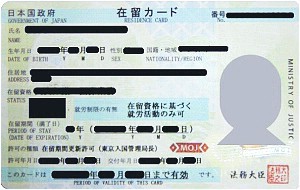
Extending residence permission
Most statuses of residence allow you to stay in Japan for a period between three months and five years. If you wish to stay longer, you must apply for an extension at an immigration bureau inside Japan before the expiry date of your current residence permission.
The application process is relatively simple, provided that you still fulfill the conditions for the specific status of residence. It typically takes a couple of days or weeks for the application to be processed, and you are allowed to remain in Japan during that time even if your previous residence permission expires in the meantime.
Changing status of residence
It is possible to change your status of residence (e.g. from instructor to arts or from student to engineer) at an immigration bureau inside Japan. You will have to provide similar documentation as you would when applying for a new status of residence at an embassy or consulate outside of Japan.
Re-entry permits
Foreign residents who wish to temporarily leave Japan for longer than a year, need to get a re-entry permit before departing Japan; otherwise, they lose their status of residence. Re-entry permits can be obtained at immigration offices in Japan. For absences of less than one year, re-entry permits are not required.
Permanent residence
Foreign residents, who have shown good conduct and have sufficient assets or ability to make an independent living, can be granted permanent residence if they reside in Japan for a certain number of consecutive years. For highly-skilled professionals and spouses of Japanese nationals, the minimum amount of years is typically one to five years, while for others it is typically ten years. Permanent residence status is indefinite and allows for any paid activity.
Naturalization
Foreigners, who have resided in Japan for at least five consecutive years (less if married to a Japanese national), have shown good conduct, have never plotted against the Japanese government, have sufficient assets or ability to make an independent living and are willing to renounce any other citizenship held, can be granted Japanese citizenship.
Questions? Ask in our forum .
Links and Resources
A guide to japanese visas, japan customs, guide to the animal quarantine service, the ministry of foreign affairs, immigration services agency of japan.

- Novel coronavirus (COVID-19)
- Any restrictions on entering Japan?
On April 29th, 2023, all border measures to prevent the spread of COVID-19 were lifted.
Those who are entering Japan on or after April 29th, 2023, will not be required to present a Valid Vaccination Certificate or a Covid-19 Negative Test Certificate.
For more information, please check the following page.
https://www.japan.travel/en/practical-coronavirus-information/
Ministry of Health, Labour and Welfare
- https://www.mhlw.go.jp/stf/covid-19/bordercontrol.html
Ministry of Foreign Affairs of Japan
- https://www.mofa.go.jp/ca/fna/page4e_001053.html
Have more questions?
Was this article helpful.
Search 57 out of 115 found this helpful
Articles in this section
- Should we cancel or postpone our trip to Japan?
- Coronavirus advisory information
- What should I do if I am infected with COVID-19 in Japan?
- Do Japanese medical institutions accept payment by credit card?
- Where can I check if tourist facilities are temporarily closed?
- Where can I check the status of events and whether shrines, temples, restaurants, etc. are open?
- World Health Organization Q&A on coronaviruses (COVID-19)
- General Information
- Climbing Mt. Fuji
- Pass/Tickets
- Safe Travel
- Maps & Brochure Request

Visit Japan Web: The Online Registration Before Arriving in Japan
Japanese customs: mysos replaced from november, 14, 2022.
During the Covid pandemic, entry procedures in Japan have changed a lot, which created some confusion. It is still somewhat the case after the reopening to tourism since October 11, even if a focus has been placed on easing the procedures especially through digitalization , to minimize human interactions and subsequent contamination risks.
Until recently, the Japanese government asked visitors to install specific app on their smartphones:
- MySOS, for advance registration of information regarding vaccine status / PCR test, for faster airport procedures in Japan (the "fast track" system)
- COCOA, an app to track contact-cases and infected persons, but it was discontinued in September 2022.
MySOS was not mandatory but highly recommended . Travelers who could not use the app were directed upon their arrival in Japan to a specific line in order to complete the necessary steps (showing a valid vaccination certificate / PCR test, etc.) which lengthened their time at the airport.
New website available since November 1st, 2022
In mid-October 2022, a new change in the procedure has been announced for all entry in Japan from November 14 included : every traveler (tourist, foreign resident and Japanese citizen alike) can register in advance on the Visit Japan Web site.
Visit Japan Web is a free, single portal to group formalities related to:
- Covid-19 🦠 ( quarantine , vaccination certificate, PCR test); The Pre-registration for Quarantine Procedures section collects the information that were previously filled in the MySOS app ("Fast Track" function);
- Immigration : the Disembarkation Card for Foreigner that was formerly handed in the plane ✈️ just before landing (does not concern Japanese citizens and foreign permanent residents);
- Customs 🛂 , with the Declaration of Personal effects and Unaccompanied Articles , to fill upon arrival, formerly either on a paper form or on the Japanese government’s Zeikan shinkoku app (税関申告アプリ).
In the facts, registering on the website has been possible since November 1, 2022 , for any arrival in Japan from November 14 in one of its largest airports:
- Tokyo -Narita,
- Tokyo-Haneda,
- Osaka - Kansai (KIX),
- Chubu ( Nagoya ),
- Fukuoka ( Kyushu ),
- New Chitose ( Hokkaido ) and
- Naha ( Okinawa ).
Travelers arriving in Japan before November 14, 2022, can still use the MySoS app to fill their Covid related data and are not the target of the Visit Japan Web.
1 blue screen and 2 QR Codes to show on a smartphone
Like with MySOS previously, each step of the registration process is ended by a change in the page display that includes:
- A blue screen , for a successful quarantine procedure registration,
- and the creation of 2 QR Codes for customs and immigration procedures.
Once all the steps are completed, a visitor’s smartphone 📱 will display first a blue screen, then 2 QR Codes to show at each checkpoint.
Starting April 29, 2023 , according to March 10 and April 26 latest announcements of the Ministry of Health, Labor and Welfare, some of the borders restrictions will be lifted and the Covid-19 quarantine procedure (blue screen) will not be required anymore .
It is highly recommended to register before departing for Japan : at the latest 6h prior to the flight’s departure, and ideally within the 10 preceding days , in order to allow time for the review of the submitted documents. Reviews are sorted by date of arrival in Japan . Visit Japan Web is available in English.
Whether you are fully vaccinated or not, consider using Visit Japan Web to make sure to board your flight to Japan, as airlines reserve the right to refuse passengers who may potentially be banned at the Quarantine Procedures step.
The necessary documents are:
- A valid email address (will be used as a user ID to each access to Visit Japan Web);
- Until April 29, 2023 , Covid vaccination certificate or negative PCR test result taken less than 72 hours before departure and translated in English (use the Japanese-English form provided by the Japanese Ministry of Health here );
- An address in Japan (for example, of the first accommodation you will be staying at).
If traveling with underage children , it is possible to register them on the same Visit Japan Web account (up to 10 travelers). Dependent or handicapped adults who cannot go through the procedures alone can also be registered in the Family members traveling with you section. However, each of them has to have their own passport or equivalent immigration document.
Each member of the family registered on the same account will also have their blue screen and 2 QR Codes, to show at checkpoints at the arrival airport in Japan.
Like with MySOS, registering with Visit Japan Web is not mandatory , however it helps going through the entry procedures in Japan faster, and reduces the hurdles of tedious formalities after 12 hours of more spent in a plane.
On April 5, 2023, Kono Taro, the Japanese Minister of Digital Affairs, announced that travelers are no longer required to show any document at arrival airport’s quarantine in Japan . However, filling information forms for immigration and customs is still a requirement.
Additional tips and advice
An Internet 📶 connection is required to use the Visit Japan Web site, especially to create the account, fill in the user’s information, and their family’s when applicable (name, passport number, etc.), the forms regarding vaccination or PCR test and create the first QR Code. The digital Disembarkation Card for Foreigners and custom procedures can be completed offline and the QR codes created upon arrival at the airport.
Creating a Visit Japan Web account is possible on a computer (Chrome browser is recommended) or on a smartphone (Chrome browser recommended on Android). In any case, before departure, make sure to be logged in only on the device you will use to travel (a smartphone ideally), and check that all information is up-to-date.
Questions asked at immigration and customs procedures are the same than on the paper forms. In any event, official Japanese sources (the Embassy of Japan or the Border Control page of the Japanese Ministry of Health for example) are the ultimate references regarding entry procedures in Japan and should be checked frequently.
- Flights and Airports
- Accommodation
- Transportation
- Internet & Phones
- Budget and money
- Japanese Food
- Visit with Kids
- Seasons: spring / summer / autumn / winter
- Weather forecast
- Time in Japan
- Holidays & Festivals
- Natural Disasters
- Customs and Duties
- Works and Closures
- September 21 -- Autumn starts in Japan
- September 23 -- Autumn Equinox (Shunbun no Hi - holiday)
- From October 9 to 10 -- Hachiman Matsuri (the Autumn Takayama Festival)
- October 22 -- Jidai Matsuri Festival in Kyoto
- October 29 -- Isao Takahata's birthday (born in 1935)
- October 31 -- Halloween in Japan
- Tokyo : Shinjuku , Shibuya , Harajuku , Asakusa , Akihabara , Odaiba , Ikebukuro , Ueno , Roppongi , Chiyoda , Ryogoku ...
- Around Tokyo: Kamakura , Nikko , Hakone , Mount Fuji , Mount Takao , Yokohama ...
- Kansai: Kyoto , Nara , Osaka , Mount Koya , Himeji , Kobe , Kinosaki , Kumano Kodo , Ise ...
- Japanese Alps: Kanazawa , Matsumoto , Takayama , Shirakawa-go , Nakasendo ...
- West: Hiroshima , Miyajima , Shikoku , Onomichi , Naoshima , Izumo , Kurashiki , Matsue ...
- South: Kyushu , Okinawa , Yakushima ...
- North: Hokkaido , Tohoku ...

- Temples and Shrines
- Gardens and Parks
- Hiking and Trekking
- Observation Decks
- Public Baths (Onsen and Sento)
- Festivals (Matsuri)
- Amusement Parks
- Visit on a Budget / Luxury

Keikaku is a travel agency specialist of Japan and providing different kind of services:
- Japan Rail Pass
- English speaking Guides
- Pocket Wi-fi
- Japan Nightlife
- Working in Japan
- Religion and Spirituality
- Arts and History
- Movies / Animated Movies
- Japanese Music
- Studio Ghibli
- Photos / Videos
- Weird Japan
- Translations
- Kana & Kanji
- Japanese Swear Words
- Honorific Suffixes (san, kun, chan...)
- Introducing yourself
- Thank you / Apologize
- Count / Say Your Age
- Say the Date / Tell the Time
- Happy birthday
- Enjoy Your Meal
- Writing your name

Kanas are the much-needed basic characters of written Japanese language. Memorize them at a fast pace with our method.

Ask any kind of question and share your knowledge about Japan in Kanpai’s community space, our Q&A section Kotaete.

Isshoni means "together" in Japanese: share your trip details (dates, places you would like to visit) and find companions to travel in Japan.
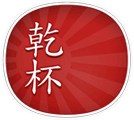
Create your Kanpai account to manage your profile and view your participation history (questions, answers).
- Itineraries
- Tours and Activities
- Travel Guides
- Best of Japan
JRailPass.com » Japan Travel Blog » Japan travel restrictions and requirements for 2023
Japan travel restrictions and requirements for 2023
May 15, 2023
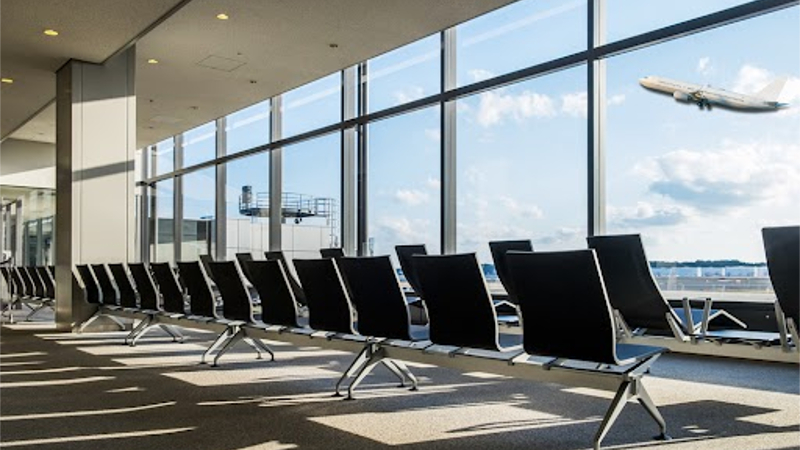
When planning a trip to Japan, make sure you know if there are any travel restrictions in place and any entry requirements you need to follow.
Japan has now completely removed all COVID-19 entry restrictions . Immigration rules have returned to normal from May 8, 2023 .
If you are thinking about traveling to Japan, you can check this regularly updated page and find out what you need to visit the country.
Below you’ll find information about the reinstatement of visa exemptions , vaccine and testing requirements, and other coronavirus measures in Japan.
Table of Contents
- 1 Can I Travel to Japan Now?
- 2.1 Public transportation restrictions within Japan
- 3.1 Rules for tourists
- 3.2 Quarantine measures when traveling to Japan
- 3.3 Countries and regions banned to enter Japan
- 4 Travel advisories
- 5 Health advice when visiting Japan
Can I Travel to Japan Now?
Yes , Japan’s borders are now open to all international tourist travel.
You can easily travel to Japan by air or by sea as long as you meet the standard entry requirements.
Japan has completely removed the entry cap on daily foreign arrivals. All the usual visa exemptions currently apply to eligible visitors. This means that citizens of around 70 countries, including Australia, the United States and all European Union nations, can once again visit Japan for 90 days visa-free simply by using a valid passport.
Once in the country, train services are running as normal. You can use your Japan Rail Pass to travel around the nation at your leisure.
Japan Standard Entry Requirements
If you’re not a national of a visa-exempt country , you’ll need a visa to travel to Japan.
You should also make sure you have a valid passport , and other necessary documentation to enter the country.
If you have an e-Passport, you can use the Electronic Customs Declaration Gates (e-Gates) when arriving in Japan to clear border control.

Public transportation restrictions within Japan
Public transport, including trains, is operating in Japan. Travelers are advised to refer to Japanese train status updates issued by each individual operator to check if a service they plan to use remains affected by temporary Shinkansen COVID-19 restrictions.
Face masks are no longer required on JR trains or in most other places. They are still common and recommended, but are ultimately optional .
Who can travel to Japan now?
Anyone who meets the normal entry requirements can now travel to Japan.
All travelers should ensure they have a valid relevant visa for Japan (unless visa-exempt), a valid passport, and other necessary documentation to enter the country.
North Koreans cannot currently enter Japan due to sanctions. Apart from this, there are no other travel bans in place.
For further information about visas and visa exemptions, please check with the Japanese Ministry of Foreign Affairs at https://www.mofa.go.jp/ .
Rules for tourists
Individual tourists can now travel to Japan. There is no longer any need to book a place on a package tour.
Although mask use is not obligatory outdoors in Japan, it is still recommended in crowds or when having a conversation at close quarters.
Quarantine measures when traveling to Japan
There are currently no quarantine measures in Japan.
For further information, please check with the Japanese Ministry of Health at https://www.mhlw.go.jp/
Countries and regions banned to enter Japan
Only citizens of North Korea are currently prohibited from traveling to Japan. This is because the Japanese government has imposed sanctions on North Korea.
All other nationalities are allowed to visit Japan with the proper documentation. All travel bans due to coronavirus have now been lifted.
Travel advisories
Check the up-to-date travel advisories for Japan regarding COVID-19 from your country below:
- New Zealand
- United Kingdom
- United States
Health advice when visiting Japan
There are no specific health requirements in place for traveling to Japan.
Visitors are advised to have health insurance and be up-to-date on standard vaccinations. Recommended vaccines include:
- Chickenpox (Varicella)
- Diphtheria-Tetanus-Pertussis
- Flu (influenza)
- Hepatitis A
- Hepatitis B
- Japanese encephalitis
- Measles-Mumps-Rubella (MMR)
Japan’s Health Ministry has stated that the two most effective ways to curb the spread of illnesses like the coronavirus are to frequently wash hands and use a face mask when out in public:
- You should wash your hands with soap and water for at least 20 seconds, or use an alcohol-based hand sanitizer containing at least 60% alcohol.
- Face masks are recommended in public. The mask should cover your mouth, nose and chin, and be disposed of after a single-use.
If you are traveling to Japan with medication, make sure you bring copy of the prescription, a doctor’s note, and bring your medicine in the original container.
For the latest travel advisory and information about restrictions, please visit the Japan National Tourism Organization’s site .
The Japan National Tourism Organization has also set up a coronavirus hotline for tourist information available in 3 languages: English, Chinese, or Korean:
- From within Japan : 050 3816 2787
- If overseas : +81 50 3816 2787
Related posts
Related tours & activities.

Japan travel requirements 2024: What travelers need to know
We aim to keep this post updated about Japan travel in 2024 with official Japan travel restrictions, requirements, and health and safety guidance. Our goal is to help you make informed decisions so you can travel confidently, safely, and responsibly in this new post-pandemic world of ours.
Since travel restrictions can vary by citizenship, we will be focusing our post on rules that affect U.S. citizens.
Last update: August 12, 2024. Originally published: July 2022.
Disclosure: This post contains some affiliate links. If you make a purchase through one of our links, we may receive a small commission, at no additional cost to you.
* Get our free Post-Pandemic Travel Checklist *
August 2024: “Tourism in Japan is at an all-time high, so you should definitely expect to encounter larger crowds and longer wait times. This is especially true for popular destinations like Tokyo, Osaka, and Kyoto; however, this can also be felt to some extent in smaller cities such as Hiroshima, Kobe, and Nagasaki. It’s pretty much business as usual in the country, although you will still find people who wear masks, especially in more crowded areas. Locally, there have been some travel restrictions implemented to help combat overtourism in more popular areas. Specifically, Kyoto and Mount Fuji have introduced regulations that aim to manage visitor numbers and limit access. That being said, Japan is very open and welcoming to visitors.” – Krysti of Wanderful Horizons , expat living in Japan
April 2024: “Tourism is really popular in Japan these days, and crowds can be difficult to avoid. T here are no more travel restrictions for Japan, so it’s a much simpler arrival process than last year. However, we still highly recommend filling out the Immigration and Customs form online for quicker arrival (see instructions below). We showed our passports and QR code at immigration and customs, did fingerprints, and had no questions asked. Wifi in both Tokyo airports can be frustratingly slow, so it’s important to screenshot/download the QR code before departure so you can access it offline. Just as it was pre-Covid, there is a percentage of Japanese people who wear masks out and about in public.” – Michelle & Jedd, Intentional Travelers
At the end of the post, we share more on-the-ground perspectives from local residents and travelers to Japan so you can get a sense of what it’s really like.
Table of Contents
Is Japan open for travel? Can I travel to Japan right now?
As of October 2022 , Japan is open for tourism for independent travelers. Visa-free travel for selected countries, including the US, has been resumed.
Tourists with U.S. passports can stay in Japan visa-free for up to three months. Find details and rules for entering Japan from other countries here .
Japan will introduce a new pre-departure requirement soon. Visa-exempt travelers will be required to submit an electronic travel authorization before departing to Japan. Check back for updates.
Japan travel restrictions have been eased but travelers are asked to follow guidelines with regard to masks, social distancing, dining etiquette, and more.
As of April 2023 , a proof of vaccination or a negative Covid-19 test are no longer required for all travelers arriving in Japan.
To facilitate the arrival process, it’s highly recommended to submit your information online through Visit Japan Web before travel.
Steps for Traveling to Japan: What to Know (2024)
For a smoother arrival, travelers to Japan can pre-register for airport Immigration and Customs to receive the QR codes used for “Fast Track” at major airports across Japan.
We completed the Japan entry process in late March 2023 and again in early April 2024. It was admittedly a bit confusing, so I thought I’d share our experience and tips, as the process is still the same (apart from step 2).
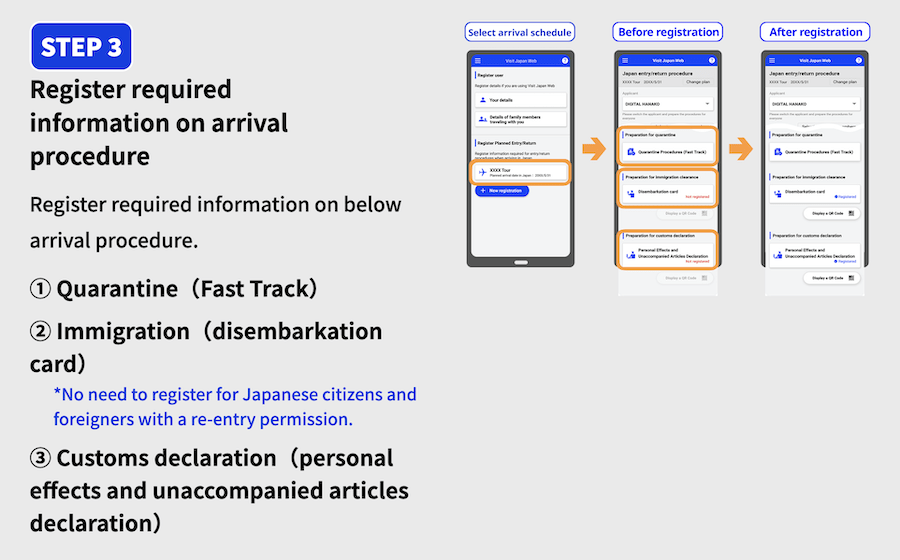
1. Register at Visit Japan Web
While the Fast Track/Quarantine procedures are no longer mandatory to complete in advance, I was glad I followed advice to pre-register through the Visit Japan Web site.
The latest they say you can register is at least 6 hours ahead of your flight to Japan .
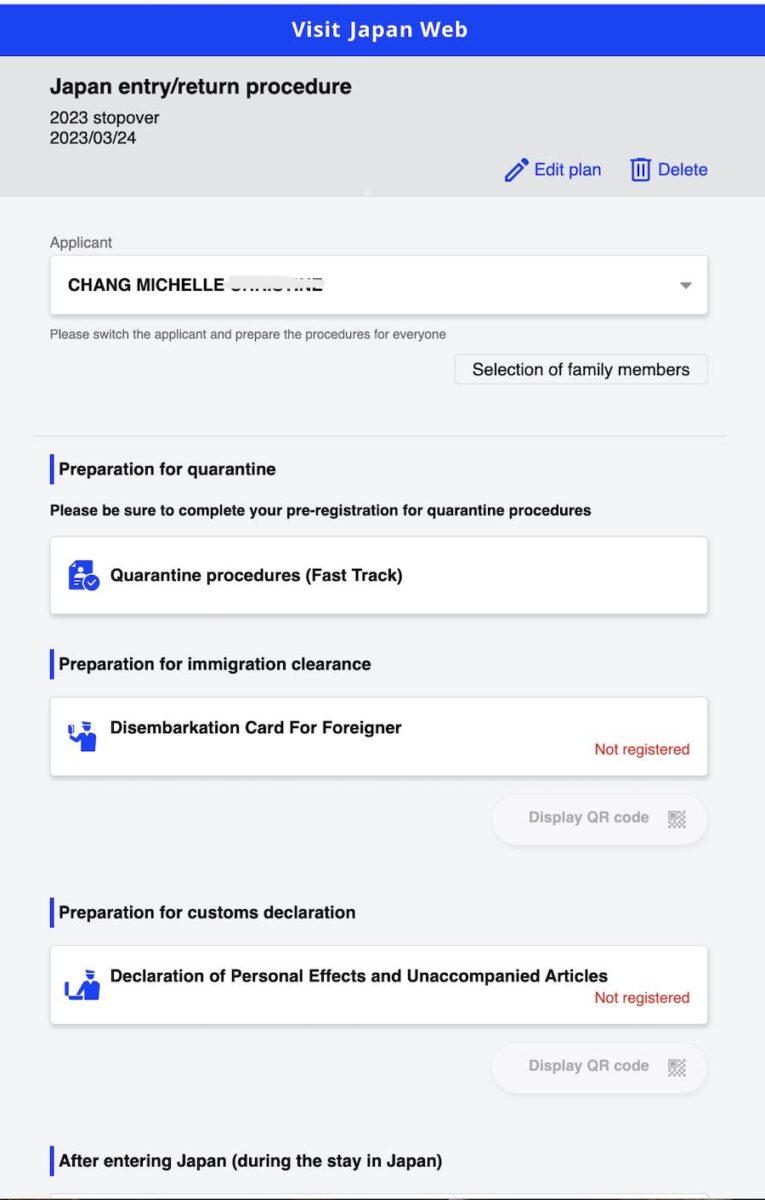
2. Submit your Covid documents in advance – NO LONGER REQUIRED
3. Register for immigration QR code
Returning to the main registration dashboard on the website, select the next module “Disembarkation Card for Foreginer,” which says it’s required for landing in Japan.
Some details pre-populated from from my profile. I selected Tourism for purpose of visit. Then there are three ways to report length of stay: year, month, day; as well as a few questions about any criminal background in Japan.
Once completed, a button “Display QR code” appears below the appropriate section.
Take a screenshot of the Immigration QR code and save it to your phone . It will have a yellow line above it.
If you don’t have the QR code , there are immigration cards available to fill out at standing desks located before entering the lines. Some people got all the way up to the immigration agent and were asked to step aside to fill out a card, which are also available next to each immigration stall.
The immigration line at Narita moved steadily but took about 25 minutes since several flights had arrived at once.
When I showed the QR code, the immigration officer simply took a headshot picture and fingerprint scans, then stuck a “landing permission” stamp in my passport for 90 days. No questions asked.
4. Register for Customs QR code
Returning again to the main dashboard, finally select “Preparation for customs declaration.” This registration allows travelers to go through an electronic declaration gate, which wasn’t super clear once we were at the airport.
I entered my flight origination (Hanoi) and number of family members with me (1). Then there’s the usual customs questions – type of goods, prohibited items, monetary funds, alcohol, cigarettes, souvenirs over 200,000y.
Again, take a screenshot of the Customs QR code and save it to your phone . It will have a blue line above it.
At Narita, the customs line for QR codes are labeled “electronic declaration” in blue. There are also kiosks that allow QR code, card, and duty free, as well as those that are for physical customs card only. The lines weren’t too long so it didn’t matter much which line we chose.
The customs officer had us scan our QR code and we could see our entered data displayed on an over-sized tablet-like device at the desk. No questions asked, we proceeded to exit the airport.
5. Sign up for travel insurance
It’s recommended to obtain insurance to cover medical costs related to COVID-19 in Japan. For travel insurance that covers Covid, we use Nomad Insurance by Safety Wing.
Quarantine rules in Japan: What happens if I get Covid?
Travelers are not required to quarantine upon arrival in Japan, provided that they are not suspected of having Covid-19. See details here .
Residents report that quarantine rules for testing positive may no longer be enforced anymore.
Previously, foreign tourists who tested positive for Covid while in Japan had to contact a local consultation center . A 7-10 days quarantine at a government-designated accommodation facility was required with all costs covered by the visitor.
The quarantine period could end within 7-10 days depending on the symptoms and/or negative COVID-19 test result. See details here .
Can I travel to Japan in September? Can I travel to Japan this Fall?
Travel to Japan in September is open . See details above and check back for updates.
Is it safe to fly to NRT Narita or HND Haneda International Airport ? Health screenings and body temperature checks are no longer in place at the airport. Wearing of masks is no longer required on flights or in the airports, though masking is still widely practiced.
Stringent cleaning and seating limits are implemented.
What is it like to fly to Japan right now? All Nippon Airways reports that masks are now optional. Additional procedures are in place at Immigration – please see details above.
Do Americans have to quarantine when traveling to Japan? No . See quarantine details above.
Does Japan check COVID-19 symptoms of incoming travelers? Health screening procedures such as temperature checks and simple symptom questionnaires are typically not in place at ports of entry anymore.
Does Japan require a negative Covid 19 test for travelers? A negative test is no longer required to enter Japan as of April 2023.
Does Japan require a proof of Coronavirus vaccine for travelers? A proof of Coronavirus vaccine is no longer required to enter Japan as of April 2023.
Do I still need to provide a negative Covid test or quarantine if I have been vaccinated? No. A negative Covid test, quarantine, or proof of vaccination are no longer required to enter Japan.
Is a booster shot required for travel to Japan? No. A booster shot is no longer required to enter Japan.
What Covid testing options are available for travelers? PCR and/or antigen tests are available for travelers in Japan. Travelers should contact the local consultation center to determine the location of testing facilities within Japan. A list of some COVID-19 testing facilities can be found here .
Test results are available within 24 to 72 hours but many labs can return results in a matter of hours. PCR test costs vary from ¥2,500 to ¥16,500.
What healthcare options are available to travelers in Japan who get the virus? Japan hospitals and clinics are open. Foreign visitors are required to secure a medical insurance which that will cover medical costs in case they contract COVID-19 in Japan.
For travel insurance that covers Covid, check out Nomad Insurance by Safety Wing >
What service businesses and restaurants are open in Japan ? Businesses and restaurants in Japan are open. Some businesses may require their own mask rules or capacity limits.
What public gatherings are allowed in Japan? Public gatherings are allowed in Japan subject to safety guidelines.
Are face masks required in Japan? As of March 2023, wearing of face masks in Japan is recommended but no longer required, except in some healthcare facilities.
Face masks are almost universally worn in public, especially in urban areas, indoors and on public transportation. The Consulate website states that failure to adhere to mask-wearing norms reflects poorly on foreign visitors.
Are buses running in Japan? Trains, buses and taxis are running as usual in Japan.
How has the Coronavirus impacted Japan?
Japan managed impressively well compared to most countries in the early days of the pandemic. Although Japan has been previously in a State of Emergency, the lockdowns were less disruptive on Japanese daily life.
However, Japan’s inbound tourism business lay dormant for years. Japan finally began easing restrictions in 2022 and reopened to travelers in June with strict entry requirements.
Japan finally eased entry requirements for travelers in October 2022 making it easier for travelers to visit the country. Visa-free travel has also been resumed for select countries.
Vaccination in Japan started later than some other countries. Around 80% of the population has been vaccinated and 64% had received a booster shot.
Tourism is now back with record numbers of visitors, however, staffing shortages have not fully recovered.
For the current situation in Japan, including: total COVID-19 positive cases; total cases in Japan; and COVID-19 testing in Japan, please see the Japan Ministry of Health site .
What should you pack for safely traveling in Japan?
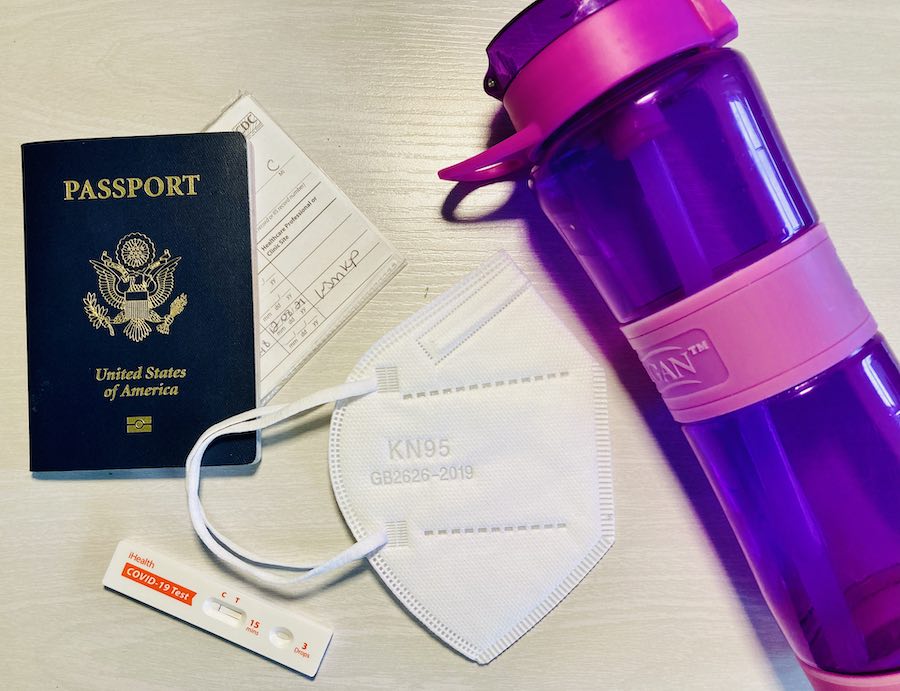
😷 Face Masks -Face coverings are recommended and widely used in public places. Find N95 masks at Bona Fide > or designer options at Vida >
💊 Medicine – Bring enough prescription and over-the-counter medication for your entire trip to avoid trips to the clinic.
💳 Vaccine Card Holder – Protect that paper CDC card when traveling abroad (if your country doesn’t offer a digital version). Get a simple plastic protector > or Vegan leather clippable > or Leather passport + card combo holder >
👃 Covid self-test – The most studied rapid antigen self-test with FDA emergency authorization. NOT valid to enter countries. Use for your own peace of mind. Order from CVS > or Walmart >
💧 Sealed water bottle – Make sure your reusable water bottle has a lid that’s not exposed to the air. We use one of each of the following: Shop insulated water bottles with protective lid > Shop water bottles with purification filter and protective lid >
✈️ Travel insurance that covers Covid – We’ve started using Nomad Insurance by Safety Wing for affordable evacuation, international medical, and trip coverage.
ᯤ Stay connected with an eSIM – learn more and look for our discount code in this eSIMs for travel post .
TIP : Traveling abroad is much easier when our smartphone stays connected. If you have our WorldWide Connectivity course (also available inside our Membership ), review the modules on eSIM Best Practices and Managing Data Usage to get the most out of your eSIM!
What do Japan locals and recent travelers say about visiting Japan now?
What is it like to visit Japan right now? It’s our goal to provide regular updates here from real people on the ground, to help potential visitors know what to expect. The following are subjective opinions only. Official travel guidance can be found above.
January 2024 – Brandon of Zimminaroundtheworld , expat living in Japan: “Japan is seeing an increase in tourism now that the country is open to visitors. Many visitors are traveling to Tokyo and Kyoto but some towns and cities like Nikko, Fukuoka, Hiroshima, and Naha are also seeing rises in tourism.
Currently there are no travel restrictions within Japan unless it is due to environmental catastrophes like the earthquake that occurred in Ishikawa Prefecture recently. Access to healthcare in Japan is easily available and affordable. Although foreigners can sometimes pay up to 200% more for healthcare it is still cheap.
Many attractions and famous sites around Japan especially in Kyoto and Tokyo are crowded with lines that are longer then expected. In general, restaurants in Japan are smaller and can only able to accommodate up to ten people or fewer and the space can feel cramped. Like anywhere else, keep an open mind and be flexible and there will be no problems while traveling around Japan.”
September 2023 – Jackie Szeto of Life of Doing , American traveler: “My husband and I traveled to Tokyo and Nikko, Japan for vacation in September 2023. Expect large crowds at major attractions, restaurants, and trains in major cities such as Tokyo and Kyoto. Visiting other destinations such as Nikko is a nice change of pace with fewer crowds, especially on the weekdays.
It’s recommended to complete the Immigration and Customs declaration on the Visit Japan Web to expedite arrival, but it’s not required. When landing at international airports, the QR codes for Immigration and Customs are still accepted. Otherwise, all COVID protocols have been dropped in the cities. Antibacterial hand sanitizer is still provided at entrances of hotels, restaurants, and shopping centers. Some people still wear masks in crowded areas and on trains, but most go mask-free.”
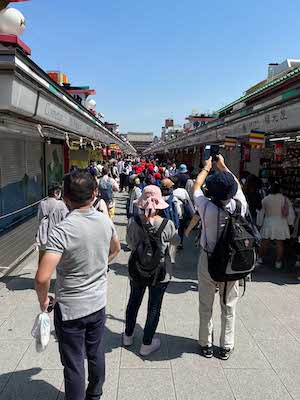
May 2023 – Sophie Pham of Delightful Travel Notes , traveler: “My husband and I were traveling in Japan for 11 days from May 11-21, 2023 for our vacation. I found that Japan had already welcomed visitors with open arms, free of earlier restrictions. The return of both domestic travelers and international tourists created a lively atmosphere, and crowds could be seen in a lot of places.
In May, it took us 45 minutes to clear immigration at Kansai International Airport after landing at around 7:45am.
All attractions and food venues were fully open, with no social distancing measures or mandatory mask rules, although some restaurant servers, locals, and taxi drivers still chose to wear masks. Some famous restaurants had long lines again, and popular attractions like Fushimi Inari, Kiyomizu-dera, and Senso-ji-ji could get crowded during the day. If there’s a particular popular restaurant you want to try, it may be best to make your dinner reservation in advance, especially for weekend. Overall, everything is lively again and we had a great time.”
March 2023 – Michelle, Intentional Travelers, American visitor: “We enjoyed a two day layover in Japan. The online procedures and QR codes were a bit confusing but I highly recommended doing them in advance of travel to make your arrival smoother.”
February 2023 – Joel, US traveler: “For the most part the Japanese are wearing masks. I’d say mask wearing is at about 99%. Despite the crowds in the city and packed trains and subways, it honestly feels way safer than generally any place in America where mask wearing is far from the majority. ANA enforces a mask wearing requirement whereas United is pretty much a free for all.
One key thing that is good to know is at the ticketing counter they need to know your return flight info when initially checking in. We had all the other Japan travel docs as far as the gov mandated requirements but this one kinda caught us off guard. The immigration line may seem staggering but it moves. ”
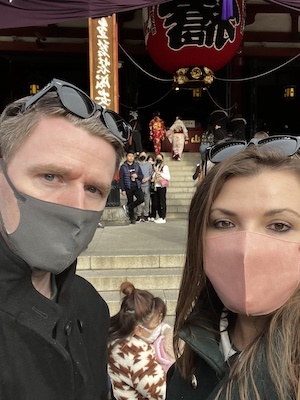
January 2023 – Lizzie of Wanderlust & Life , UK traveler: “I flew to Tokyo in January 2023 for 3 days as part of a stopover between Australia and the UK. For us it felt like the country is so happy to welcome tourists again. We were slightly worried about visiting or entry restrictions changing last minute but the airline kept us up to date and apart from filling out a lot of forms on arrival it felt quite normal being there.
As Japan only opened recently there weren’t as many tourists as we were expecting which was a plus really. We were made to feel so welcome in the country.
Masks are mandatory indoors and everyone seemed to be following this. The vast majority of people were also wearing masks outdoors too. Sanitiser is readily available in restaurants and tourist attractions. We didn’t encounter any contact tracing or even requests to show covid passes. The only frustration we had was that we flew JAL and we had to wear masks our whole flight which was about 14 hours in one go and this was enforced by cabin crew.”
November 2022 – Darryl H., New Zealand traveler: “My visit to Japan involved a return to the sort of measures that, in my home country of New Zealand, had been abandoned some time ago. The first action on arriving at Tokyo’s Narita Airport, with my mask firmly in place, was to allow officials to check and confirm I had complied with mandatory online registration of evidence of my vaccination status. Once this had been done, the arrivals process was pretty much standard.
During my 10-day stay, I experienced no restrictions on my movements or activities. The differences were in the roles of masks, sanitiser and – in some instances – distancing. The wearing of masks indoors and on public transport is close to one hundred percent, whether or not they are demanded. Outdoors, in most situations, they appear to be worn by at least 98 percent of people, although in some areas later in the evening there is an obvious relaxation in standards – especially among younger people. While most tourists appear happy to comply with the standards followed by locals, the proportion of non-mask use by non-Japanese is clearly larger than by Japanese. At no stage did I see any visitor reproached for this.
There is sanitiser on hand (pun intended) everywhere. It is probably accessed by about a third of people. There are many locals who are fastidious about sanitising.
While I observed no enforced distancing on public transport or in the street, it is definitely in place in cafes and other eateries. Most places I visited had plastic partitioning between patrons, and crosses to discourage the use of every second seat. Groups or couples are, of course, welcome to sit together.
The buffet breakfast in my hotel illustrates all three of the above differences. When I arrived at breakfast each morning, masked of course, the attendant ensured that I first sanitised my hands and then put on plastic gloves. Only then could I approach the serving implements and food. I would then sit on one of two seats (the second having a cross on it), both of which were partitioned off from the next pair of seats. Seats with another seat opposite were separated by another plastic partition. If I wanted to return to the buffet for more food, I first had to remask and re-glove. Once I forgot the gloves, and was politely turned back before I could touch the serving implements.
It is not uncommon for Japanese hospitality venues to give high priority to cleanliness, but there seems to be super-high priority now. Where in New Zealand I might expect a quick wipe over of a table between customers, in Tokyo it now appears to be a thorough and sometimes deep clean.
The precautions in no way reduced my pleasure in revisiting Tokyo. And they increased at least my perception of being protected.”
September 2022 – Jackson, American visitor: “Traveling to Japan reminded me of the COVID situation in Hawaii a year ago. People go about their day with a medical mask. Every store front has hand sanitizers and thermo cameras. COIVD testing and vaccination clinics are common place. Despite these COVID precautions, Japanese residents and businesses continue to welcome visitors with refreshing grace and hospitality. Japan’s omotenashi , beautiful scenery, and extraordinary delicacies are worth exploring and appreciating, but can tempt visitors into overlooking the uncertainty that underlines Japan. I hope visitors will take the time to learn about the challenges of the Japanese people and reciprocate Japan’s hospitality with a gracious thank you.”
Aug 21 2022 – Y., American Japanese dual citizen: “ I returned from visiting family in Japan two days ago. Travel is still tough. The plane was empty – only 20 passengers on a big airplane. My pre-travel Covid test was 10 minutes earlier than the required 72 hours so I was turned away at the airport. I scrambled to find a last minute PCR test with rapid results and rush back to the airport.”
August 2022 – Christine, American visitor: “Japan isn’t currently open to tourists. I was there for a school conference, and had to get a conference visa. One has to get a visa for Japan in advance and you can only get one with an EFRS form filled out from someone in Japan.
I had to have a negative PCR test from within 72 hours of departure time. There’s eased quarantine procedures, which depend on the countries you’ve been to in the previous 2 weeks. And you have to have the MySOS app on your phone because they might check up on you. It also expedites your entry because you can upload all the necessary forms/COVID test/questionnaire ahead of time.
Everyone wears a mask everywhere, and they’re available for cheap at convenience stores. Because I was on a university’s campus most of the time, I had to report my temperature and if I was having any symptoms to the University every day.”
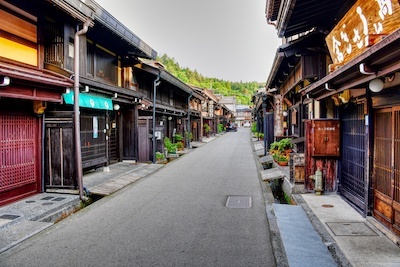
July 2022 – Brandon of https://zimminaroundtheworld.com , Expat in Japan: “Currently Japan is only doing guided tours for international tourism. Travel entry for normal tourism is not an option at the moment. I recently took a trip around central Japan and visited a variety of cities and saw hardly any tourists. It’s nice to get great photos of popular attractions without crowds of people in the photos. But at the same time, it is taking a toll on the economy. I’ve seen shops and restaurants struggle to survive here and locals begging for tourism to come back.
Masks have been worn in Japan even before Covid. To this day, the majority of the population wears masks and obeys the rules, this includes both foreigners and locals. I wear a mask when leaving my apartment and only take it off when social distancing can be achieved or while eating at a restaurant. The positive aspect about Covid is that there are no long lines to enter attractions or eating establishments. I feel public transportation is safe here as the Japanese are very good and sanitizing everything.”
Planning a trip to Japan?
Check out our other Japan travel resources: – Great Things To Do Around Iwakuni, Japan – JAL Premium Economy Review Haneda to Hawaii – Hawaiian Airlines Business Class A330-200 Review Honolulu to Narita
If you have questions or updates about travel to Japan during the Coronavirus crisis or post-pandemic, please let us know in the comments below.
~ Pin this post for later or share with friends ~
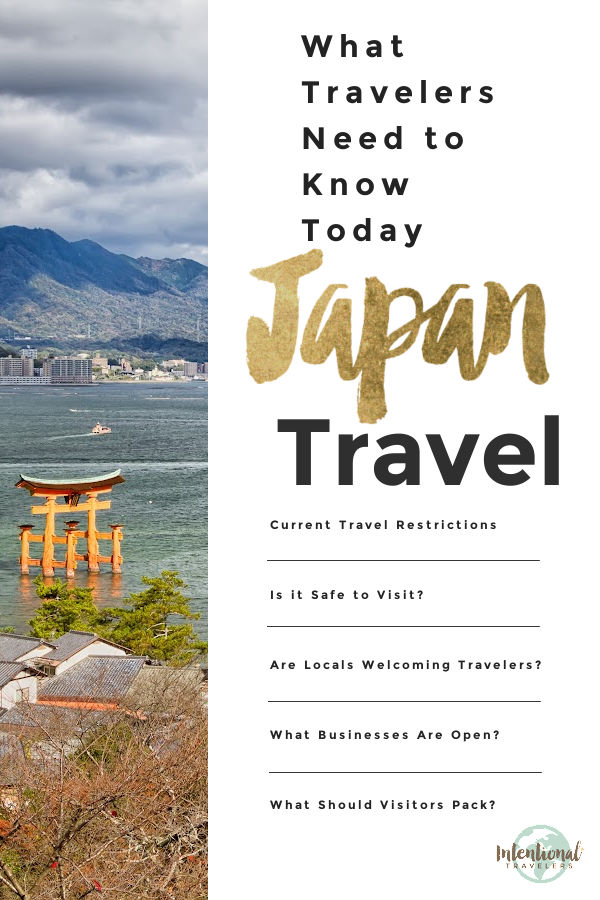
Disclaimer: Please note, travel restrictions change frequently. Readers must take responsibility for verifying information through official sources like the State Department and CDC, in respect to their specific situations. No responsibility can be accepted by Intentional Travelers for action or inaction as a result of information provided through IntentionalTravelers.com. Any information provided here is issued as general information only.
Similar Posts

Lisbon Portugal travel requirements 2024: What travelers need to know
We aim to keep this post updated about Lisbon travel in 2024 with official Portugal travel restrictions, requirements, and health and safety guidance. Our goal is to help you make informed decisions so you can travel confidently, safely, and responsibly in this new post-pandemic world of ours. As restrictions vary based on the traveler’s citizenship,…
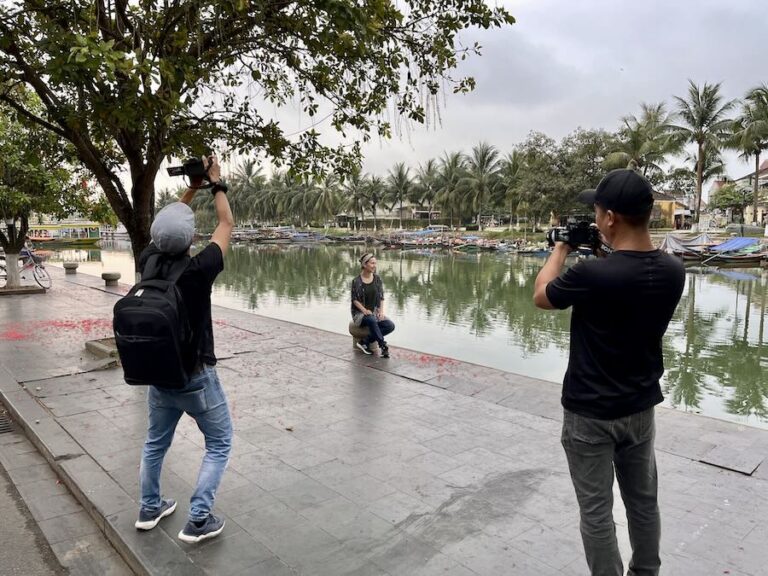
What Not To Do in Hoi An Vietnam – Important Things to Know
Welcome to our guide on what not to do in Hoi An, Vietnam! Since our second trip to Vietnam back in 2016, Hoi An has captivated our hearts and become a favorite place for extended stays. Initially drawn by its well-preserved Ancient Town and the promise of warm weather, we quickly learned that Hoi An…
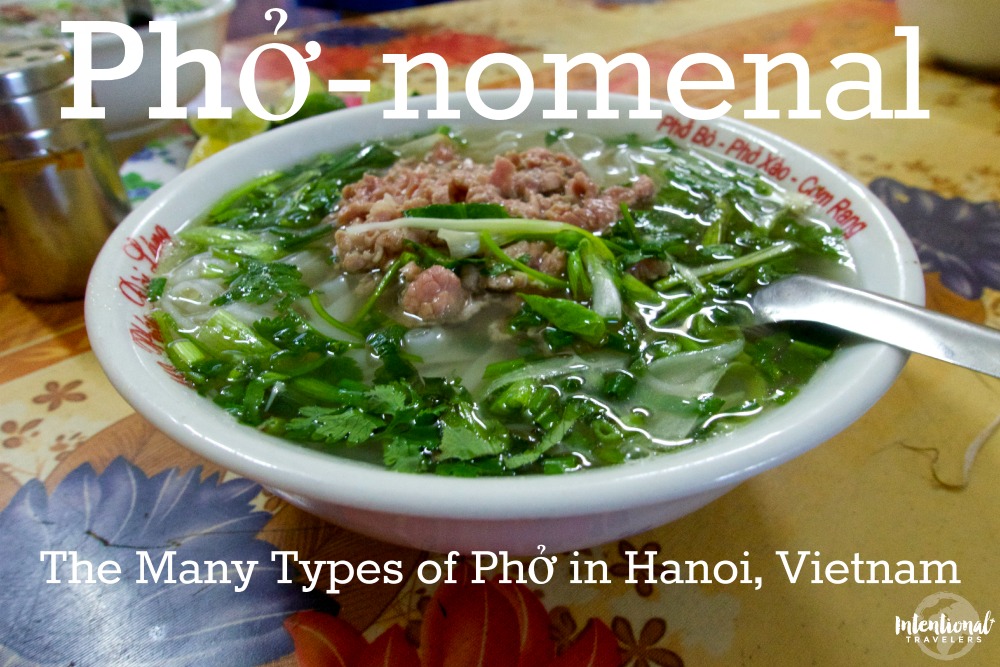
Phở-nomenal: The Many Types of Phở in Hanoi, Vietnam
Historians say that phở got its start in and around Hanoi at the turn of the century. So when we visited earlier this month, sampling the phở was high on our to do list. What is Phở? What we didn’t realize is that the Vietnamese noodle soup we’re familiar with from back home is just one kind of phở. The…

Philippines travel requirements 2024: What travelers need to know
We aim to keep this post updated about Philippines travel in 2024 with official Philippines travel restrictions, requirements, and health and safety guidance. Our goal is to help you make informed decisions so you can travel confidently, safely, and responsibly in this new post-pandemic world of ours. As restrictions can vary based on the traveler’s…
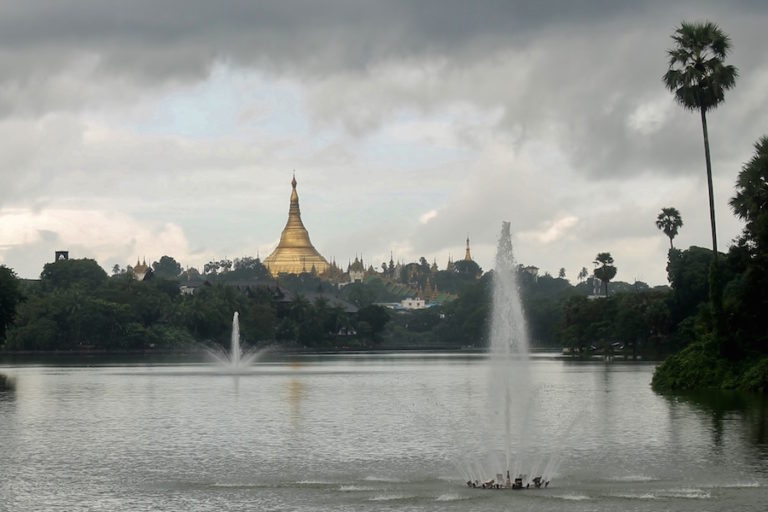
5 Hidden Gems of Yangon, Myanmar
In South East Asia, Myanmar is one of those places that many people want to see because it is still a fairly new destination on the tourist circuit, given the recent change in government circumstances. While guidebooks and travel blogs are improving by leaps and bounds, these are a few diamonds in the rough that…
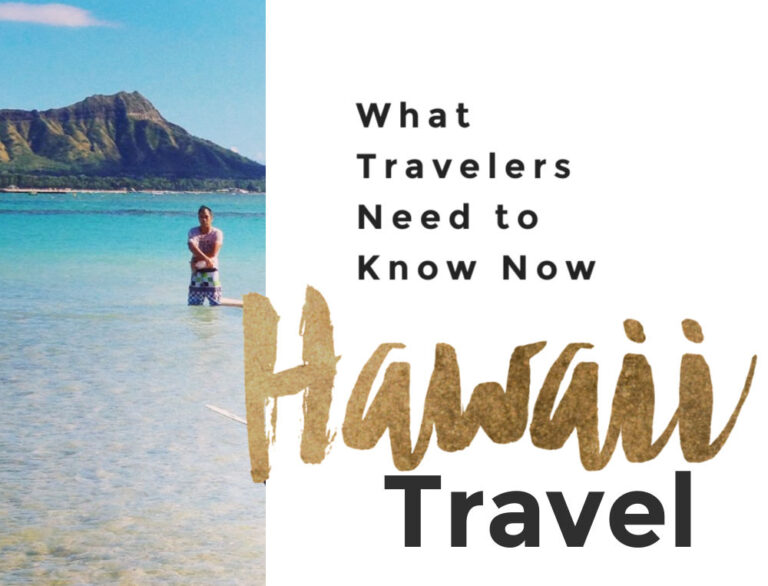
Hawaii travel requirements 2024: What travelers need to know
We aim to keep this post updated about Hawaii travel in 2024 with official Hawaii travel restrictions, requirements, and health and safety guidance. Our goal is to help you make informed decisions so you can travel confidently, safely, and responsibly in this new post-pandemic world of ours. At the end of the post, we share…
Hi Great article ! I noticed you have been vaccinated once with JJ (same here) . You mentioned the requirements for boosters but it sounds like you haven’t had a booster? I tried to sort through the link page but couldn’t find any further info. So my question is I’m planning to travel after May 8th with 1 JJ vaccination, I’m Canadian, but will be coming from Indonesia. Thanks for any insight you might have
Hi and thanks for visiting our blog. While we had the single JJ vaccination, we also had boosters. I mentioned it because the Japan entry form allows you to essentially count JJ as two shots out of the three that are required. In other words, at least one booster is currently required for entry to Japan. That said, vaccine documentation will no longer be required after May 8 so you shouldn’t have to worry about it.
I am travelling to the US from Australia via Japan in September. I fly with JAL, from Melbourne (MEL) arriving at Haneda International Airport (HND), but need to fly out of Narita International Airport (NRT) to New York (JFK).
I would like to know if I will be allowed to travel, via Japan, in September.
Australia is in Blue Category and I have had 3rd dose of Covid vaccination.
I look forward to your reply soon.
Thank you for your question. Unfortunately, it’s difficult to say what will be possible in September, as we do expect the rules to change over time. Currently, foreign travelers are limited to package tours and may not use public transit. To find out if any exceptions can be made for transit between airports, you can try the Japan visitor hotline .
Leave a Reply Cancel reply
Your email address will not be published. Required fields are marked *
This site uses Akismet to reduce spam. Learn how your comment data is processed .
We’re sorry, this site is currently experiencing technical difficulties. Please try again in a few moments. Exception: request blocked
- Media & Industry
- Meetings & Events
- Select Language 简体中文 繁體中文(香港) 繁體中文(臺灣) India (English) Bahasa Indonesia 한국어 ภาษาไทย Tiếng Việt Singapore (English) Philippines (English) Malaysia (English) Australia/New Zealand (English) Français Deutsch Italiano Español United Kingdom (English) Nordic countries(English) Canada (English) Canada (Français) United States (English) Mexico (español) Português العربية Japan(日本語) Global (English)
- India (English)
- Bahasa Indonesia
- Singapore (English)
- Philippines (English)
- Malaysia (English)
- Australia/New Zealand (English)
- United Kingdom (English)
- Nordic countries(English)
- Canada (English)
- Canada (Français)
- United States (English)
- Mexico (español)
- Global (English)
- Fujiyoshida
- Shimonoseki
- Ishigaki Island
- Miyako Island
- Kerama Island
- Tokyo Island
- Koka & Shigaraki
- Hida Takayama
- Ginza, Nihonbashi
- Beppu & Yufuin (Onsen)
- Ginzan Onsen
- Nagasaki Islands

- Kumano Kodo
- Shikoku Karst
- Amami Oshima
- Hachimantai
- Omihachiman
- Aizuwakamatsu

- Diving in Japan
- Skiing in Japan
- Seasonal Flowers in Japan
- Sustainable Outdoors
- Off the Beaten Track in Japan
- Scenic Spots
- World Heritage
- Home Stays & Farm Stays

- Japanese Gardens
- Japanese Crafts
- Temple Stays
- Heritage Stays
- Festivals and Events
- Theater in Japan
- Japanese Tea Ceremony
- Cultural Experiences in Japan
- Culture in Japan

- Local Cuisine Eastern Japan
- Local Cuisine Western Japan
- Local Street Food
- Japan's Local Ekiben
- Japanese Whisky
- Vegetarian and Vegan Guide
- Sushi in Japan Guide
- Japanese Sake Breweries

- Art Museums
- Architecture
- Performing Arts
- Art Festivals
- Japanese Anime and Comics
- Japanese Ceramics
- Local Crafts

- Scenic Night Views
- Natural Wonders
- Theme Parks
- Samurai & Ninja
- Iconic Architecture

- Wellness Travel in Japan
- Japanese Ryokan Guide
- A Guide to Stargazing in Japan
- Relaxation in Japan
- Forest Bathing (Shinrin-yoku)

- Experiences in Japan
- Enjoy my Japan
- National Parks
- Japan's Local Treasures
- Japan Heritage
- Snow Like No Other
- Wonder Around Japan

- Visa Information
- Getting to Japan
- Airport Access
- COVID-19: Practical Information for Traveling to Japan
- Anime Tourism
- Countryside Stays
- Accessible Tourism
- Hokkaido Great Outdoors
- Scenic World Heritage in Tohoku
- Shikoku’s Nature and Traditions
- Southern Kyushu by Rail

- Traveling by Rail
- How to Travel by Train and Bus
- JR Rail Passes
- Scenic Railways
- Renting a Car
- Sustainable Travel in Japan
- Travel Brochures
- Useful Apps
- Online Reservation Sites
- Eco-friendly Accommodation
- Luxury Accommodations
- Traveling With a Disability
- Hands-free Travel
- How to Book a Certified Tour Guide
- Volunteer Guides
- Tourist Information Center

- Japanese Manners
- Spring in Japan
- Summer in Japan
- Autumn in Japan
- Winter in Japan
- Cherry Blossom Forecast
- Autumn Leaves Forecast

- Japan Visitor Hotline
- Travel Insurance in Japan
- Japan Safe Travel Information
- Accessibility in Japan
- Vegetarian Guide
- Muslim Travelers
- Safety Tips

- JAPAN Monthly Web Magazine
- Arts & Cultures
- Nature & Outdoor
- Festivals & Events
- Insider Blog
- Things to do
- Local Guides
- Food & drink
- Traditional
- Hokuriku Shinetsu

My Favorites
${v.desc | trunc(25)}
Planning a Trip to Japan?
Share your travel photos with us by hashtagging your images with #visitjapanjp

Japan is now open to travelers from all countries or regions. For more information, please check "COVID-19: Practical Information for Traveling to Japan" page.
Languages: English / 한국어 / 简体中文 / 繁體中文(臺灣) / 繁體中文(香港) / Tiếng Việt / Bahasa Indonesia
Coronavirus (COVID-19)
Measures by the government.
Last updated: Tuesday, May 9, 2023
Table of Contents
Measures by the government of japan.
1. Areas subjected to entry ban
2. Denial of the re-entry from designated countries/regions in response to COVID-19 variants of special treatment on border measures
3. Quarantine measures
4. Suspension of visa validity
5. Suspension of visa exemption measures
6. Restrictions on airports/ports for arrival
7. Visit Japan Web
All coronavirus-related information on this website is gathered from the government ministries and authorities responsible for handling COVID-19 restrictions and measures. Due to the regularly changing situation and the constant updating of information, it is essential that you always check for updates and follow the latest guidance from the relevant ministries and official bodies.
Information about entry into Japan
1. Denial of permission to entry
The denial of landing that had been placed on all countries/regions was lifted on September 4, 2022.
For details, please check the following page. https://www.mofa.go.jp/ca/fna/page4e_001053.html#section1
2. Denial of re-entry from certain countries/regions among designated countries/regions in response to COVID-19 variants of special treatment on border measures
Currently, there are no subject countries/regions.
For details, please check the following page. https://www.mofa.go.jp/ca/fna/page4e_001053.html#section2
3. Quarantine measures (New)
From April 29, 2023, regarding all travelers and returnees (NEW)
(1) Travelers and returnees will no longer be required to submit either a certificate of negative result of COVID-19 test conducted within 72 hours prior to departure, or a valid COVID-19 vaccination certificate of three doses or equivalent. (2) Currently implemented measures including provisional random sampling tests for all travelers and returnees arriving from China (excluding Hong Kong and Macau) by direct flights, will be replaced with testing on arrival required only by those who show symptoms of COVID-19 (a measure applied to all travelers and returnees).
For more detail, please refer to the Ministry of Health, Labour and Welfare Border Measures page (open in a new window).
For more detail, please refer to the Ministry of Health, Labour and Welfare
4. Lifting of the suspension of visa validity
Single entry visas and multiple entry visas issued by Embassies, Consulate-Generals and Consulates of Japan in all countries/regions and whose validity had been temporarily suspended were resumed again on October 11, 2022.
Validity of visas already issued under “Business Track” or “Residence Track” and visas issued based on “New border measures (4)” (referred in Note 2 of Article 1), for the time being, has been suspended from January 21, 2021, based on the announcement of the Government of Japan dated January 13, 2021.
Border Measures page .
For details, please check the following page. https://www.mofa.go.jp/ca/fna/page4e_001053.html#section8
5. Lifting of the suspension of visa exemption measures
The visa exemption arrangements which had been temporarily suspended under the border measures were resumed on October 11, 2022.
For countries/regions applicable to the visa exemption arrangements, please visit the link below:
The effect of Pre-Clearances (i.e. visa exemptions) granted by the Japanese Government to APEC Business Travel Card (ABTC) issued by the following countries was also resumed on October 11, 2022. For more information on the APEC Business Travel Card (ABTC), please refer to the link below:
APEC Business Travel Card (ABTC)(Japanese)
Asia Brunei, China, Hong Kong, Indonesia, Republic of Korea, Malaysia, Philippines, Singapore, Taiwan, Thailand, Viet Nam Oceania Australia, New Zealand, Papua New Guinea Latin America and the Caribbean Chile, Mexico, Peru Europe Russia
For details, please check the following page. https://www.mofa.go.jp/ca/fna/page4e_001053.html#section9
6.Restrictions on airport/ports for arrival
Airports/ports that suspended international flights/cruises have started to lift the suspension as their preparations are completed.
For details, please check the following page. https://www.mofa.go.jp/ca/fna/page4e_001053.html#section10
Visit Japan Web is a convenient way to register information for immigration, customs and Tax-free shopping service before you enter Japan. After the registration, QR codes are generated.
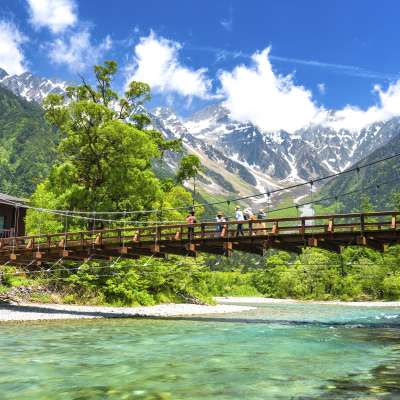
Did this information help you?
out of found this information helpful.
Thank you for your feedback.
- Coronavirus (COVID-19) / Measures by the Government
Please Choose Your Language
Browse the JNTO site in one of multiple languages
- Travel Advisories |
- Contact Us |
- MyTravelGov |
Find U.S. Embassies & Consulates
Travel.state.gov, congressional liaison, special issuance agency, u.s. passports, international travel, intercountry adoption, international parental child abduction, records and authentications, popular links, travel advisories, mytravelgov, stay connected, legal resources, legal information, info for u.s. law enforcement, replace or certify documents.
Get a Passport
Renew or Replace a Passport
Get My Passport Fast
Prepare to Apply
Passport Help
Legal Matters
Renew or Replace a Passport Homepage
Share this page:
Renew by Mail
Renew Online
Change or Correct a Passport
Report my Passport Lost or Stolen
Replace a Limited Validity Passport
Get Copies of Passport Records
Eligible U.S. citizens who want routine service can now renew their passports online.
If you do not qualify to renew online, you may also renew by mail .
Follow these steps to renew your passport online and track your status:
Confirm you meet the requirements
- Create your account
Start your application
- Enter your most recent passport info
Enter travel plans
- Upload digital photo
Sign and pay
Enroll in email updates.
You can renew online if you meet all these requirements:
- The passport you are renewing is or was valid for 10 years, and you are age 25 or older.
- We issued the passport you are renewing between 2009 and 2015, or over 9 years but less than 15 years from the date you plan to submit your application.
- You are not changing your name, gender, date of birth, or place of birth.
- You are not traveling for at least 8 weeks from the date you will submit your application. We will only offer routine service , and the time it takes to get a passport will be the same as renewing by mail.
- You are applying for a regular (tourist) passport. You cannot renew a special issuance (diplomatic, official, service) passport online.
- You live in the United States (either state or territory). You do not qualify to renew online if you live in a foreign country or have an Army Post Office (APO) or Fleet Post Office (FPO) address.
- You have your passport with you, and it is not damaged or mutilated, and you have not reported it as lost or stolen. Keep your most recent passport and do not mail it to us.
- You can pay for your passport using a credit or debit card.
- You can upload a digital passport photo.
- You are aware that we will cancel the passport you are renewing after you submit your application. You cannot use it for international travel.
If you do not qualify to renew online, you may be able to renew by mail or in person at a passport agency or center .
Create your account
Click the Sign In button on the MyTravelGov homepage. Clicking the button will take you to Login.gov where you can sign in as an existing customer or create a new account.
Watch a video explaining how to create an account.
Find answers to frequently asked questions about the process of creating an account.
After creating your account, click on the "Renew Your Passport" button on the home page to start your application.
You can save your application and finish it at a later date. You have 30 days to complete your application after you start it. If you do not complete your application in 30 days, you will need to start over.
Enter info about your most recent passport
At this stage, we check the passport(s) you are renewing against our records to see if you can renew online.
- Enter your information as we printed it on the passport you are renewing.
- Try again if you believe you should be eligible to renew online. We may be experiencing temporary, technical issues with our system.
- If you are not eligible to renew online, the application will give you a list of reasons. Double check your information before re-entering it.
Validity of Most Recent Passport : Make sure your most recent passport is or was valid for 10 years. The passport must be expiring within one year or have been expired less than five years.
Your Name : Check the spelling, capitalization, hyphens, and spacing between letters in your name and compare them to your most recent passport.
- If your last name is spelled "McDonald" but printed as "Mc Donald," (with a space), make sure you enter your name as "Mc Donald"(with the space included) on the application.
- If your last name is spelled “Smith-Jenkins“ (with a hyphen) and printed in your most recent passport with the hyphen, try entering your name as “Smith Jenkins” (without a hyphen) or "SmithJenkins" (with no space). We will add the hyphen to your name when we review your application.
Passport Book, Passport Card, or Both Documents : You can renew passport books and passport cards online. If you want to renew a passport book but not a passport card, leave the card section blank on the application. If you want to renew a passport card but not a passport book, leave the book section blank.
The following chart explains what documents you can renew online:
Watch this video to learn how to enter info about your passport
If you are traveling in less than 8 weeks, you cannot renew online. We are only offering routine service .
- Routine times do not include mailing times.
- Routine times are the same for customers who renew online and by mail.
Need your passport in 3-8 weeks? Get expedited service and renew by mail .
Need your passport in less than 3 weeks? Make an appointment to renew in person at a passport agency or center.
Upload a digital photo
You will need to upload an original, digital photo in .JPEG file format.
- Go to our Uploading a Digital Photo page to see photo examples and requirements.
- Have someone else take your photo. No selfies.
- Do not scan a photo, or take a photo of an already printed photo.
Watch this video to learn how to upload a digital photo
Paying for your Passport
To complete your application, you must pay all passport fees using a credit or debit card. Click the “Sign and Pay” button which will take you to pay.gov where you will pay your passport fees.
Confirming Payment
We will send you emails about the status of your payment.
The first email will notify you that your payment is pending. The second email will confirm we processed your payment. If we are unable to process your payment, you will receive an email asking you to login to your account and pay again.
Check your spam or junk folder if you do not see the emails in your inbox.
Keep Your Most Recent Passport
When you complete your application, you will need the passport you are renewing on hand. Keep your most recent passport. Do not mail it to us, or try to use it to travel since we will cancel it.
One week after you apply, go to our Online Passport Status System to enroll in more emails about the status of your application. We will notify you when your application is in process, approved, and when we send your passport. We will also notify you if we need more information to process your application.
Our Application Status page includes details about what each status message means.
Watch this video to learn what to do after you apply
How to get support
Request faster service or change your mailing address.
If your travel plans change, you may request expedite service for an extra $60, or 1-2 delivery of your completed passport book for an extra $21.36. One-to-two day delivery is not available for passport cards. We only send cards via First Class Mail.
If you are changing your mailing address, please note your new address must be in the United States (either state or territory). You cannot use an Army Post Office (APO) or Fleet Post Office (FPO) address.
Call the National Passport Information Center at 1-877-487-2778 . Provide your application number, or your last name and date of birth.
After you contact us, you won’t see any changes to your application in your MyTravelGov account.
Respond to a request for more information
Follow the instructions in the letter or email. You must respond within 90 days of the date on the letter or email. Our Respond to a Letter or Email webpage has tips and reminders on how to respond.
Contacting us if you need help
There are two different paths for support:
Technical Support for your Account : Contact the Login.gov team if you need help changing your password, verifying your account, or changing your account information.
Customer Support for your Passport Application : Contact us at 1-877-487-2778 if you have an issue completing your passport application, or you want to upgrade to expedited service, 1-2 day delivery, or change your mailing address.
Processing Times for Renewing Online
Routine: 6-8 weeks*
Expedited: We do not offer this service if you are renewing online. Mail us your application and supporting documents.
Urgent Travel: We do not offer this service if you are renewing online. Make an appointment at a passport agency or center.
*Mailing times are not included in processing times . Processing times only include the time your application is at one of our passport agencies or centers. The total time to get your passport includes both processing and mailing times.
External Link
You are about to leave travel.state.gov for an external website that is not maintained by the U.S. Department of State.
Links to external websites are provided as a convenience and should not be construed as an endorsement by the U.S. Department of State of the views or products contained therein. If you wish to remain on travel.state.gov, click the "cancel" message.
You are about to visit:

IMAGES
VIDEO
COMMENTS
If you need after-hours assistance in an emergency, please call 03-3224-5000 and ask to speak with the Embassy's duty officer. Emergency Contact Information for U.S. citizens. Emergency Preparedness for U.S. citizens in Japan. Sources of Help, including counseling services. Medical Assistance in Japan.
Enroll in the Smart Traveler Enrollment Program (STEP) to receive security messages and make it easier to locate you in an emergency. Call us in Washington, D.C. at 1-888-407-4747 (toll-free in the United States and Canada) or 1-202-501-4444 (from all other countries) from 8:00 a.m. to 8:00 p.m., Eastern Standard Time, Monday through Friday ...
Last updated: Wednesday, May 31st, 2023. Get ready for your dream trip to Japan! Japan is now open to travelers from all countries or regions! Those who enter Japan on or after April 29th 2023 are not be required to present a valid vaccination certificate or a Covid-19 negative test certificate.
Japan has made agreements to waive visa requirements for tourism with 61 countries and regions. You can find more information about this on the Embassy's visa section page. If you need to obtain a visa for your travels, please contact your nearest Consulate General of Japan or call the Visa Section of the Embassy at 202-238-6800.
Japan is now open to travelers from all countries or regions. Travelers are required to provide either a valid COVID-19 vaccination certificate (3 doses) of WHO-approved vaccines or a certificate of negative result of pre-departure COVID-19 test conducted within 72 hours prior to departing from the originating country/region.
VISA. August 1, 2024. Japanese. With regards to visa inquiries, you can contact "Foreign Residents Support Center (FRESC) MOFA Visa Information" or "the Japan Visa Information Hotline" listed on the website of the Embassy or Consulate General of Japan. For more information and advice, please contact the Consular Section of the ...
If you are a citizen of one of the over 50 countries with which Japan has a "general visa exemption arrangement", you need only a valid passport to enter Japan as a "temporary visitor". Otherwise, you need to obtain a visa before entering the country. Temporary visitors from most countries are allowed to stay for up to 90 days.
Those who do not meet vaccination requirements still need to present a negative COVID-19 test resultbefore boarding. Pre-registration of Visit Japan Web is required in order to enter Japan. Please click herefor details. Checklist for Documents required to enter Japan Certificate for COVID-19 testother than the designated format stated above may be
Fingerprint/Photo Requirements for Entry to Japan All foreign nationals entering Japan, with the exemption of certain categories listed below, are required to provide fingerprint scans and be photographed at the port of entry. This requirement does not replace any existing visa or passport requirements. Foreign nationals exempt from this new requirement include special permanent residents ...
Any foreign visitor entering Japan must have a valid passport for the duration of their stay, and all visitors must comply with the conditions of their visas. See below for information about the current visa requirements for Japan. Visa Information. If you have any further questions, please contact the Japanese embassy or consulate in your ...
Japan Travel Advisory. Japan - Level 1: Exercise Normal Precautions. Reissued after periodic review without changes. Exercise normal precautions in Japan. Read the country information page for additional information on travel to Japan. If you decide to travel to Japan: Enroll in the Smart Traveler Enrollment Program (STEP) to receive Alerts ...
Any restrictions on entering Japan? On April 29th, 2023, all border measures to prevent the spread of COVID-19 were lifted. Those who are entering Japan on or after April 29th, 2023, will not be required to present a Valid Vaccination Certificate or a Covid-19 Negative Test Certificate. For more information, please check the following page.
Latest Japan Entry Requirements. Last updated 04 October 2023, 00:00 BST. Summary. Since October 2022, Japan is fully open without the requirement for a visa for most visitors and, since April 2023, vaccination certificates and pre-departure tests are no longer required either. Read on to find out more!
Effective November 30, 2021 at 00:00, entry of new, non-resident foreign nationals (to include students on educational travel) will be suspended. Travelers who are permitted to enter Japan will be required to quarantine at home, a private residence, or in a hotel for 14 days subject to approval by the Government of Japan.
During the Covid pandemic, entry procedures in Japan have changed a lot, which created some confusion. It is still somewhat the case after the reopening to tourism since October 11, even if a focus has been placed on easing the procedures especially through digitalization, to minimize human interactions and subsequent contamination risks.. Until recently, the Japanese government asked visitors ...
When planning a trip to Japan, make sure you know if there are any travel restrictions in place and any entry requirements you need to follow.. Japan has now completely removed all COVID-19 entry restrictions.Immigration rules have returned to normal from May 8, 2023.. If you are thinking about traveling to Japan, you can check this regularly updated page and find out what you need to visit ...
Travel during daylight hours only, especially in rural areas. If you choose to drive a vehicle in Japan, learn the local traffic laws and have the proper paperwork. Get any driving permits and insurance you may need. Get an International Driving Permit (IDP). Carry the IDP and a US-issued driver's license at all times.
Tourists from all countries or regions can visit Japan on a package tour (including non-guided package tour). Learn about the current situation, checklist for tourists, entry restrictions and safety measures before you travel.
Japan travel restrictions have been eased but travelers are asked to follow guidelines with regard to masks, social distancing, dining etiquette, and more. As of April 2023, a proof of vaccination or a negative Covid-19 test are no longer required for all travelers arriving in Japan.
For Travelers. Information in case of illness or injury. Official announcements from the Government of Japan. Answers to your questions about traveling to Japan and staying safe during COVID-19, including where to get help if you need it.
People needing consultation services related to COVID-19 vaccines may contact the Tokyo Metropolitan Government COVID-19 Vaccine Side Effects Consultation Center at 03-6258-5802. Assistance: Follow us on Twitter and Facebook . U.S. Embassy Tokyo. Telephone: 03-3224-5000, After-Hours: 03-3224-5000. Email: [email protected].
Here's a quick step-by-step to help you through the Visit Japan Web application process: Step 1: Before your flight, create an account on Visit Japan Web and log-in. Step 2: Register the following information: Step 3: Once you're done filling up the information above, register for the following arrival procedures:
Notice: All border measures to prevent the spread of COVID-19 were lifted on April 29th, 2023. Those who are entering Japan on or after April 29th, 2023, are not be required to present a Valid Vaccination Certificate or a Covid-19 Negative Test Certificate.
Overview. The Visa Waiver Program (VWP) enables most citizens or nationals of participating countries* to travel to the United States for tourism or business for stays of 90 days or less without obtaining a visa. Travelers must have a valid Electronic System for Travel Authorization (ESTA) approval prior to travel and meet all requirements explained below.
The window to obtain a first-time U.S. visitor visa for the FIFA World Cup in 2026 is closing for some soccer fans, the U.S. Travel Association said at a press event this week, though the federal ...
If you are changing your mailing address, please note your new address must be in the United States (either state or territory). You cannot use an Army Post Office (APO) or Fleet Post Office (FPO) address. Call the National Passport Information Center at 1-877-487-2778 . Provide your application number, or your last name and date of birth.